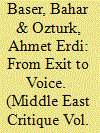|
|
|
Sort Order |
|
|
|
Items / Page
|
|
|
|
|
|
|
| Srl | Item |
| 1 |
ID:
188181


|
|
|
|
|
| Summary/Abstract |
The authoritarian turn in Turkey compelled many citizens to change life trajectories which included extreme measures such as migration and exile. Thousands of people left Turkey in the last decade, this recent wave constituting one of the largest Turkish migrations to Europe and beyond. The profile of the migrants included those who were comfortable with and/or opposed the current regime’s political and social policies, members of oppressed minority groups, Gülen movement members who are accused of orchestrating the failed 2016 coup attempt as well as white collar and secular Turkish citizens who made lifestyle migration choices because of the political and economic developments in the country. The article focuses on the narratives of a specific group within this new wave, those whom we refer to as Turkey’s intelligentsia in exile, and who decided to leave Turkey following the Gezi protests in 2013. The findings are based on 25 interviews conducted in 2021 with former academics, activists, artists, journalists and politicians who migrated to a variety of locations as a result of pending trials or arrest warrants against them, dehumanization discourse that pro-regime politicians directed toward them, as well as lack of freedom of speech and assembly.
|
|
|
|
|
|
|
|
|
|
|
|
|
|
|
|
| 2 |
ID:
188174


|
|
|
|
|
| Summary/Abstract |
Diasporas have become a topic of academic and political discussion and interest since 2000. Until recently, most diaspora research has focused on the ways the states in the Global North ‘receive’ outsiders but has devoted limited scrutiny to the role of sending states in shaping opportunity structures abroad.1 The recently growing literature on diaspora politics draw our attention to the rise of state-led diaspora engagement initiatives which aim at cultivating, (re)building, (re)shaping and (de/re)mobilizing diasporas. Currently, more than one hundred states have established forms of diaspora engagement policies and institutions, with a variety of motivations.2 Scholars try to understand the development of diaspora-engagement policies cultivated by political actors in the homeland from various disciplines including international relations, political science and sociology.
|
|
|
|
|
|
|
|
|
|
|
|
|
|
|
|
| 3 |
ID:
173147


|
|
|
|
|
| Summary/Abstract |
The diaspora studies literature recently has indicated an expansion in state-led diaspora engagement initiatives and burgeoning diaspora governance institutions around the world. Home states have correlated concepts such as public diplomacy and soft power with these nascent incentives to cultivate and mobilize diasporas for state interests. Despite the interpretation of these developments as the expansion of citizenship rights for the diaspora and their systematic incorporation back into the home nation, some authors remain skeptical about the multifaceted motives behind such initiatives. Authoritarian states particularly employ diaspora governance as a mechanism to monitor and control diaspora groups, which home communities perceive as dissidents. Using Turkey and its recent diaspora governance policy as a case study, this article demonstrates that diaspora governance enables the state to create, depending on the context, potentially ideological and repressive transnational state apparatuses that can assume both positive and negative forms.
|
|
|
|
|
|
|
|
|
|
|
|
|
|
|
|
|
|
|
|
|